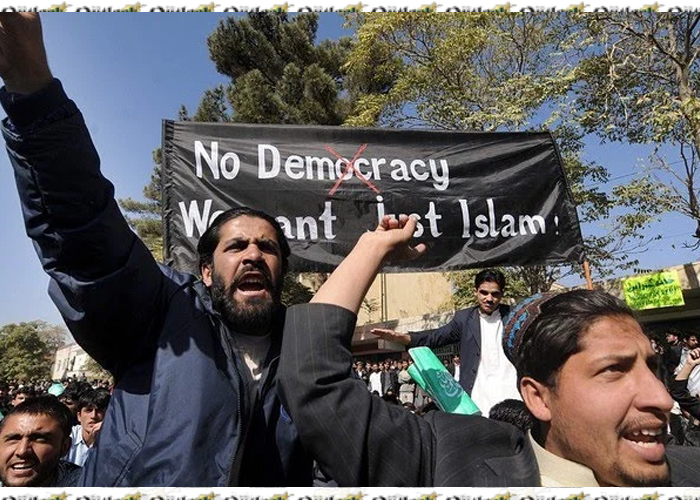Although most third-world countries such as Afghanistan are of the claimant of having democratic system, least of them led to peace and stability. Although we live under a democratic system, our country abounds with undemocratic phenomena such as inequality, election fraud, discrimination, selective legal persecution, and marginalization of women and racial groups. Thus, violence, corruption, poverty, unemployment, and more importantly poor governance are the inherent features of most third world democracies.
Now, the main question is what is the difference between Western democracy and democracy of third world countries such as Afghan democracy? Specifically, why the soil of Afghanistan does not produce the same result, which produced in western countries?This article is going to comparatively discuss the features of western democracies with turbulent democracy of Afghanistan. The first difference between our democracy and western democracy is the principle of legitimacy. In western countries, the action and behavior of the government are originated from the public will. In other words, the legality or validity of political power originates from the will of people, not other elements such as religious and ethnicity superiority, family, foreign supports, and so on. Therefore, the governments in western democracies are always accountable and answerable to all citizens. On the other hand, the citizens willingly obey the government and feel it pertains to their own. Unfortunately, the level of legitimacy and level of obedience is extremely low in third-world countries such as Afghanistan. In western democracies, the people support political system as long as it ensures social and economical orders and fulfills their needs. It means, as soon as the political system loses its functionality or accountability, it will also lose its legitimacy. The level of illegitimacy depends on the level of public dissatisfaction and it will intensify when the elites of the ruling system show more obstinacy against public will and demand. If we look at most of the social uprising in the country, it is largely rooted in public dissatisfaction combined with the obstinacy of the ruling government. Therefore, the people will not only disobey that government but also stand against it. For example, this is about two decades that people of Behsood requesting the central government to protect them against Cochi (nomadic people), Daesh, and Taliban but their voices were never heard while thousands of people displaced and a hundred others were either killed or injured due to the mentioned reasons. Eventually, the people of Behsood were compelled to seek help from people like Alipour and led to recent tension.
The second difference between western democracy and third-world democracy such as Afghanistan is the principle of equality. The principle of equality refers to equality of citizens against the law and the enjoyment of equal rights and privileges in the country, but what is often accepted in Third World societies is, in fact, the nominal democracy that overshadows many of society’s inequalities. As a consequence, huge gaps between government and people created in third-world countries such as Afghanistan. In Afghanistan, still there are some unwritten ethnic laws that do not allow democracy to take root in the country. For example, Hazara people still cannot work as a minister in important ministries of the country such as foreign ministry, interior ministry and so on.
In other words, most of the third-world countries are suffering monopolistic policies while they live under a democratic system. These kinds of political trends will not only cause public dissatisfaction but also identity and security crises. In this case, the political conflicts intensify when the political factors combined with sociological and psychological factors. In other words, if the government could not provide equal opportunities among citizens and if it could not fulfill the social and economical demands of the people, they will get angry and may join the opposition groups or establish new opposing groups. Thus, the ruling system will face more political challenges, especially when it loses the balance of political power. The balance of political power amongst various groups can cause a civil war but imbalance of power will pave the way for domination of powerful groups with hidden and unhidden dissatisfactions.
The third difference between western democracy and third-world democracy such as Afghanistan is the principle of freedom. The principle of freedom refers to individual freedom such as freedom of expression, freedom of faith, freedom of work, freedom of women, freedom of trips, and freedom of criticism, and so on. In western democracies, freedom is not of enacted rights, it is natural rights and human rights. In western democracy, freedom is as important as it considered as a controller of the governments from autocracy. Therefore, western democracies have certain mechanisms such as separation of powers, rule of law, and independence of judiciary system to ensure freedom and equality within a political system.
As pointed out, the separation of power is considered one of the best ways to prevent probable dictatorships and centralization of power. The founder of this theory is Montesquieu who warned if the three powers are centralized by one individual, all the freedoms will be annihilated.
Concerning rule of law, it is defined versus the rule of an individual or individual despotism in western democracies. Therefore, western democracies are based on legal mechanisms such as free and fair elections, the sovereignty of people, and parliament. Concerning the independence of the judiciary system, the judiciary acts not only as of the authority to hear only people’s cases but also oversees government violations and also oversees the relations between public power and individual. In western democracies, the judiciary has the power and authority that even overturn the decisions of the president and government agencies, while in third world countries such as in Afghanistan it does not breathe without the permission of the president.
Home » Opinion » The Difference between Afghan Democracy and its Western Prototype
The Difference between Afghan Democracy and its Western Prototype
| Mohammad Zahir Akbari

